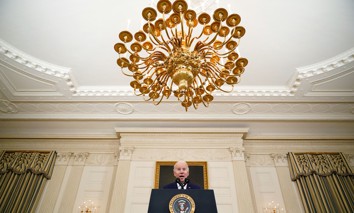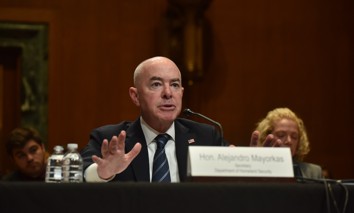Oversight
When -- and how often -- are SBA staffers going into the office? A senator wants the agency's IG to find out
Sen. Joni Ernst, R-Iowa, continued her criticism of federal agencies’ use of telework, calling for the Small Business Administration’s inspector general to investigate its office utilization rates after its administrator disputed the GAO’s findings.
Management
Biden’s FLRA nominees move closer to Senate confirmation
Senators appeared poised Wednesday to advance the nominations of aspiring leaders in labor-relations.
Tech
NIST adds 5 new members to its AI Safety Institute
The new members will focus on AI objectives related to national security, standards development and more.
Pay & Benefits
Estate planning for federal employees: Maximize benefits and minimize taxes
Make sure to review and update your estate plan regularly to reflect changes in your financial situation and personal circumstances.
Sponsor Content
Modernizing public health care
Discover how Optum Serve helped leading federal agencies address systemic problems and improve community health and well-being efficiently, effectively and sustainably.
Tech
Feds move to make gov websites more accessible to people with disabilities
It’s the first time the federal government has ever issued rules clarifying how the more than 30-year-old Americans with Disabilities Act applies online. But the new rules come with a hefty price tag for state and local governments.
Management
Texas Republicans urge Senate Democrats to give the DHS secretary a full impeachment trial
The House voted to impeach Alejandro Mayorkas on Feb. 13 over charges of refusing to enforce the law and “breach of public trust.”
Tech
100,000 have used IRS Direct File to submit their tax returns
The agency has not yet determined whether the pilot program for the tool will be extended into a permanent offering.
Sponsor Content
Navigating the AI revolution: Strategies for ethical implementation in federal civilian agencies
An industry expert offers an insightful demystification of AI, delving into core principles and best practices the company infuses into service, as well as advice for an ever-changing future.
Management
OPM Director will leave the Biden administration
Kiran Ahuja oversaw efforts to transform the federal government’s HR agency into a government-wide leader on human capital policy, issuing new policies governing interns, telework and civil service protections.
FEATURED INSIGHTS
Pay & Benefits
VA is trimming its PACT Act claims backlog, but enrollees may be on the ‘low side’
Veterans Affairs Secretary Denis McDonough says that the department is quickly processing new claims made by veterans exposed to toxic substances during their military service, thanks, in part, to robust hiring, but warns that those claims may not have hit their peak yet.
Pay & Benefits
Bill wants to solve the coverage gap for National Guard and reservists by extending VA eligibility
Legislation from Rep. Joe Neguse, D-Colo., proposes to expand VA health care benefits to personnel in the reserve components when not on active duty to help ensure “force readiness.”
Workforce
Biden rescinds COVID-era executive orders, folding safer federal workforce task force
The Office of Personnel Management issued new guidance last week rescinding some forms of COVID-19-related administrative leave, but preserving four hours of paid leave for federal employees to get vaccine booster shots.
TSP TICKER
FUND
G
F
C
S
I
APR 16 CLOSE
$18.1861
$18.5822
$79.0772
$76.9531
$40.7323
DAILY CHANGE
0.0021
-0.0599
-0.1625
-0.3162
-0.4047
THIS MONTH (%)
0.19
-2.61
-3.81
-6.65
-4.33
FUND
L 2060
L 2050
L 2040
L 2030
L INCOME
APR 16 CLOSE
$15.6736
$31.5046
$52.5937
$46.3678
$25.3143
DAILY CHANGE
-0.0793
-0.1380
-0.2021
-0.1479
-0.0352
THIS MONTH (%)
-4.35
-3.75
-3.29
-2.73
-1.15
FUND
APR 16
CLOSE
CLOSE
DAILY
CHANGE
CHANGE
THIS
MONTH
MONTH
G
$18.1861
0.0021
0.19
F
$18.5822
-0.0599
-2.61
C
$79.0772
-0.1625
-3.81
S
$76.9531
-0.3162
-6.65
I
$40.7323
-0.4047
-4.33
L 2050
$31.5046
-0.1380
-3.75
L 2040
$52.5937
-0.2021
-3.29
L 2030
$46.3678
-0.1479
-2.73
L 2020
$None
None
L INCOME
$25.3143
-0.0352
-1.15
Management
Senate Republicans push for Mayorkas impeachment trial
Democrats say the charges are based on policy disputes rather than the “high crimes and misdemeanors” threshold of an impeachable offense.
Management
Biden’s environmental justice scorecard offers more questions than answers
The White House's own environmental justice progress report gives little insight into the green benefits delivered to disadvantaged communities.
Oversight
HHS removed Login from its grantee payment system after funding theft
Hackers used data from a federal contracting hub to steal funding from seven grantee organizations in an HHS breach that occurred last year. Both HHS and GSA say that Login.gov was not compromised or connected to the theft.
Management
House advances spy power reauthorization bill without warrant measure
The bill — which represents a win for Biden administration policy objectives — will now be taken up in the Senate, with a week to go before the authority sunsets.
Management
Taxes are due even if you object to government policies or doubt the validity of the 16th Amendment’s ratification
The IRS "has stated repeatedly that a taxpayer does not have the right to refuse to pay taxes based on religious or moral beliefs."
Management
OPM rule removes Social Security numbers from mailed documents
The federal HR agency finalized a rule Friday that would help prevent potential identity theft by restricting the inclusion of Social Security numbers in mailed documents and establishing criteria for protecting the information.
Management
Skills-based hiring for contractors advances in the House
The Allowing Contractors to Choose Employees for Select Skills Act would remove degree requirements from federal contract work in some instances.
Oversight
Russian hackers accessed federal agencies' emails in Microsoft breach, CISA says
The alert comes a week after Microsoft was faulted in a Homeland Security Department report for fostering a security culture that enabled a similar China-backed cyberattack last year.
Tech
EEOC says HR software company Workday should face bias claims in lawsuit
The federal agency filed an amicus brief in a case in which a job applicant is alleging algorithmic discrimination.
Tech
How TSA’s opt-outs for biometric screenings informed White House AI policy
The Office of Management and Budget’s recent guidance on the government’s responsible use of AI elevates TSA's practice of allowing travelers to decline biometric scans at airport security to national policy.
Workforce
OPM finalizes reforms to federal internship programs
Biden administration officials hope improvements to the federal government’s Pathways Program will make it more appealing for potential applicants and easier to use as an agency recruitment tool.
Pay & Benefits
































































